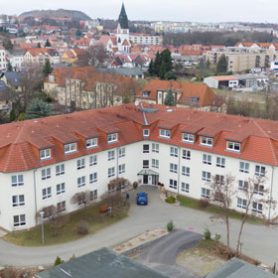A rising star in Europe’s healthcare real estate industry

The Luxembourg-based alternative investment fund manager Threestones Capital recently acquired its fifteenth nursing home in Germany for GEFCARE REAL ESTATE FUND – its third real estate vehicle for investing in nursing homes in Germany.
With this transaction, the leading private equity healthcare real estate company has invested more than 400m euros in the sector, representing more than 50 assets and 4,000 beds. Threestones plans to invest through its fund TSC Fund SCA SICAV-SIF at least 100m euros this year and a further 600m euros over the next three years across Europe, with its recently launched fourth investment vehicle EUROCARE REAL ESTATE FUND targeting 0.8–1bn euros in senior living investments.
Germany is the largest market in Europe for the care of the elderly, with nearly 900,000 beds in approximately 13,000 nursing homes (30% of the total European market). Recent studies show that additional 2,550 new facilities with 100 beds each will be required by 2030, in order to cope with the demographic change and, in particular, the ageing ‘baby boomers’. “In the early 1990s, German authorities identified the costs that will result from this situation and created a long-term care insurance system,” says Giovanni Perin, Managing Partner at Threestones Capital.
The German long-term care insurance (or ‘Pflegeversicherung’) is funded by a mandatory insurance contribution of 2.55% that is directly deducted from wages. When an individual enters a nursing home, the care insurance generally covers almost half of their costs, which range between 2,000 and 3,500 euros per month, 30% are covered by their pension and the rest is being paid by the social security, if the resident is not able to pay. The allowance received by the residents is the same, whether the nursing home is operated by a public or a private operator, across Germany. “The long-term care system will certainly continue to evolve,” says Perin, “however the recent change in legislation has to be seen as a considerable improvement, especially as the growing number of dementia patients now receive more support from the care insurance than under the old system.”
Threestones Capital invests most of its funds in Germany, although substantial amounts are also allocated to other European countries, such as Italy and Spain. Driven by demographic change, the European nursing homes sector grows at an annual rate of 5%. Nonetheless, the sector can still be qualified as highly fragmented with single transactions amounting to 8–15m euros and the number of quality portfolios available on the market remains very limited. Threestones strategy consists of creating a high-quality, homogeneous portfolio of nursing homes properties and divest it after a period of 5–8 years to institutional investors.
Last year, Threestones successfully sold a portfolio of 14 nursing homes to an institutional investor for 140m euros. The deal is considered to be “one of the most important and most successful transactions in the sector ever”, says Perin, who has more than 10 years of experience in the European healthcare market. The company realised a net return for its investors corresponding to a 1.6x multiple of invested equity (equal to a Net IRR of 14%). The performance was achieved by a unique combination of recurring cash flow and capital appreciation. Basically, “two-third of the return stems from cash flow generated by the rents, which makes the investment very attractive from a reward-risk perspective”, says Perin.
The sector increasingly attracts large institutional investors due to its anti-cyclical nature, strong cash flow, very low correlation with markets and resilience to economic shocks. In 2016, transaction volume in this sector in Germany alone amounted to more than 3bn euros, versus an estimated 300m euros in 2010 (volume multiplied by 10 in 6 years). “Portfolio deals accounted for most of last year’s transaction volume,” confirms Perin.
Threestones does not operate nursing homes but acquires only the properties which are rented out to top tier national, or international nursing homes operators, with long-term lease agreements (typically 20–25 years). The long-term inflation-linked leases with leading operators ensure a high level of predictability of cash flows and very low performance volatility over the holding period.
Giovanni PerinThe sector is currently marked by consolidation and experiencing a wave of national and pan-European cross-border M&A transactions. Thanks to its deep knowledge of the market and its key players, Threestones Capital typically positions itself as the real estate partner of choice for M&A transactions involving operators willing to sell both the operating company and the care property.
“Threestones will not only take over the nursing home, but also structure the deal together with a major operator that is willing to sign a long-term lease,” says Perin.
The strong performance of Threestones Capital’s investment vehicles, the increasing appetite of institutional investors for nursing homes portfolios and the ongoing consolidation of the operator market, show that healthcare property investments have become part of the mainstream investment landscape.
Further information
threestonescapital.com


